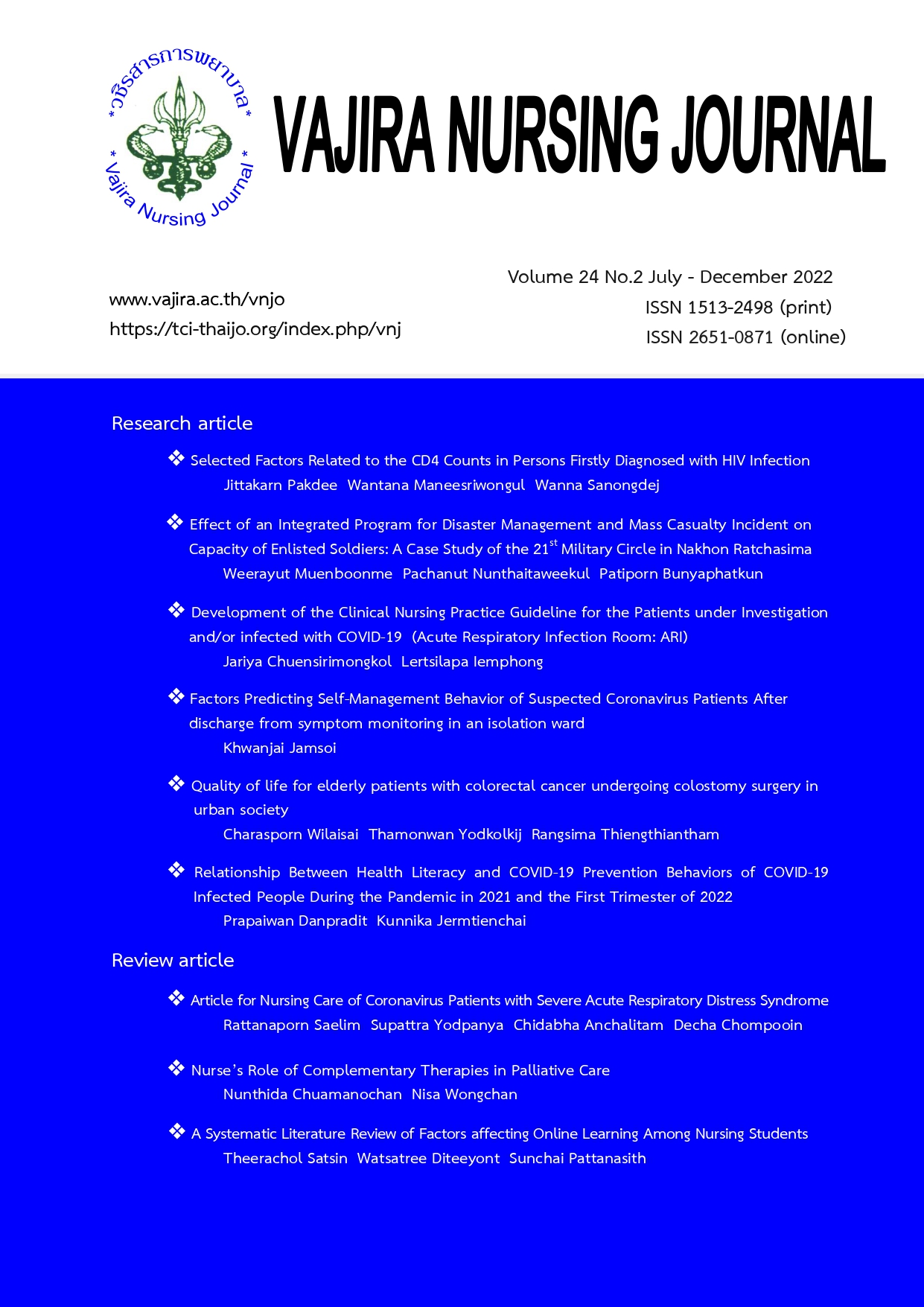ปัจจัยคัดสรรที่มีความสัมพันธ์กับระดับซีดีโฟร์ ของผู้แรกรับการวินิจฉัยการติดเชื้อเอชไอวี
Main Article Content
บทคัดย่อ
การศึกษาครั้งนี้เป็น Descriptive correlational study เพื่อหาความสัมพันธ์ของปัจจัยที่เกี่ยวข้องกับระดับซีดีโฟร์ของผู้แรกรับการวินิจฉัยการติดเชื้อเอชไอวี กลุ่มตัวอย่างมีจำนวน 189 คน เก็บข้อมูลด้วยแบบสอบถามจากประสบการณ์ที่เกิดขึ้นในช่วงเวลาที่วินิจฉัยการติดเชื้อเอชไอวีครั้งแรก วิเคราะห์ข้อมูลด้วยสถิติเชิงพรรณนาและไคสแควร์ ผลการศึกษาพบว่า กลุ่มตัวอย่างมีซีดีโฟร์ 2-1,200 เซลล์ต่อลูกบาศก์มิลลิเมตร มัธยฐาน 180 เซลล์ต่อลูกบาศก์มิลลิเมตร ผลการวิเคราะห์ความสัมพันธ์ พบว่า อายุ การรับรู้ภาวะสุขภาพ อุปสรรคส่วนบุคคลในประเด็นเรื่องกลัวการเจาะเลือด อุปสรรคที่เกี่ยวข้องกับบริการตรวจเลือดและสถานบริการในประเด็นเรื่องไม่ทราบสิทธิการรักษา/การตรวจหาการติดเชื้อเอชไอวี และไม่มีบริการให้คำปรึกษาทางโทรศัพท์ มีความสัมพันธ์กับระดับซีดีโฟร์ของผู้แรกรับการวินิจฉัยการติดเชื้อเอชไอวีอย่างมีนัยสำคัญทางสถิติ ดังนั้น ผู้ให้บริการสุขภาพควรเพิ่มช่องทางและรูปแบบการประชาสัมพันธ์ เพื่อให้ข้อมูลข่าวสารเกี่ยวกับการตรวจวินิจฉัยการติดเชื้อเอชไอวีและโรคเอดส์ การรักษาด้วยยาต้านไวรัส สิทธิการรักษา ตลอดจนส่งเสริมให้ประชาชนที่รับรู้ความเสี่ยงของตนเองเข้ารับการตรวจหาการติดเชื้อเอชไอวี ซึ่งสิ่งเหล่านี้จะช่วยให้ผู้ติดเชื้อสามารถเข้าสู่ระบบการรักษาด้วยยาต้านไวรัสได้เร็วขึ้นและลดการแพร่เชื้อเอชไอวี
Article Details

อนุญาตภายใต้เงื่อนไข Creative Commons Attribution-NonCommercial-NoDerivatives 4.0 International License.
เนื้อหาและข้อมูลในบทความที่ลงตีพิมพ์ในวชิรสารการพยาบาลถือเป็นข้อคิดเห็นและความรับผิดชอบของผู้เขียนบทความโดยตรง ซึ่งกองบรรณาธิการไม่จำเป็นต้องเห็นด้วย หรือร่วมรับผิดชอบใด ๆ ทั้งสิ้น
บทความ ข้อมูล เนื้อหา รูปภาพ ฯลฯ ที่ได้รับการตีพิมพ์ในวชิรสารการพยาบาล ถือเป็นลิขสิทธิ์ของวชิรสารการพยาบาล หากบุคคลใดหรือหน่วยงานใดต้องการนำทั้งหมดหรือส่วนหนึ่งส่วนใดไปเผยแพร่ต่อหรือเพื่อกระทำการใด ๆ จะต้องได้รับอนุญาตเป็นลายลักอักษรจากวชิรสารการพยาบาลก่อนเท่านั้น
เอกสารอ้างอิง
UNAIDS. UNAIDS DATA 2019. Joint United Nations Programme on HIV/AIDS. [Internet]. 2019 [cited 20 Jun 19]; Available from https://www.unaids.org/ sites/ default/ files/media_asset/2019-UNAIDS-data_en.pdf
National health security office. HIV Prevention service follow-up workshop 2019. [Internet]. 2019 [cited 2019 May 12]; Available from https://www.hfocus.org/content/ 2019/05/17198
Bureau of AIDS Tuberculosis and STDs Department of disease control. Report on progress of Thailand in ending the AIDS problem 2018. Nonthaburi: NC Concept Co., Ltd; 2018. (in Thai)
Andersen RM. Revisiting the behavioral model and access to medical care: does it matter?. Journal of health and social behavior. 1995 Mar 1:1-10.
Carrizosa CM, Blumberg EJ, Hovell MF, Martinez-Donate AP, Garcia-Gonzalez G, Lozada R, Kelley NJ, Hofstetter CR, Sipan CL. Determinants and prevalence of late HIV testing in Tijuana, Mexico. AIDS patient care and STDs. 2010 May 1;24(5):333-340.
Shen ZW, Dai SY, Ye DQ. Intention to undergo HIV testing and associated factors among women in one high–HIV prevalence city. International journal of nursing practice. 2017 Jun;23(3):e12533.
Buchner A, Erdfelder E, Faul F,. GPOWER: A general power analysis program. Behavior research methods, instruments, & computers. 1996 Mar;28(1):1-1.
Orathai P, Phumonsakun S. Power analysis and sample size estimation using G*power program. [thesis]. Bangkok: Thammasat University; 2013. (in Thai)
Maneesriwongul W, Sa-nongdej W, Ponboobpha A, Pakdee J. A study of access to HIV-testing and access to antiretroviral therapy (under new policy providing treatment regardless of CD4 count) [dissertation]. N.p.; 2020
AIDSinfo. Epidemiological Status. U. N. A. I. D. S. [Internet]. 2016 [cited 2018 Jun 15]; Available from http://aidsinfo. unaids. org/.
Girardi E, Aloisi MS, Arici C, Pezzotti P, Serraino D, Balzano R, Vigevani G, Alberici F, Ursitti M, D’Alessandro M, Monforte AD. Delayed presentation and late testing for HIV: demographic and behavioral risk factors in a multicenter study in Italy. JAIDS Journal of Acquired Immune Deficiency Syndromes. 2004 Aug 1;36(4):951-959.
Deblonde J, De Koker P, Hamers FF, Fontaine J, Luchters S, Temmerman M. Barriers to HIV testing in Europe: a systematic review. European journal of public health. 2010 Aug 1;20(4):422-432.
Leta TH, Sandøy IF, Fylkesnes K. Factors affecting voluntary HIV counselling and testing among men in Ethiopia: a cross-sectional survey. BMC Public Health. 2012 Dec;12(1):1-2.
Musumari PM, Chamchan C. Correlates of HIV testing experience among migrant workers from Myanmar residing in Thailand: a secondary data analysis. PloS one. 2016 May 3;11(5):e0154669.
Thepthien B, Srivanichakorn S, Apipornchaikul K, Subhaluksuksakorn P. Factors contributing to the voluntary counseling and HIV testing for persons at risk of HIV infection in Thailand [thesis]. Nakhon Pathom: Mahidol University; 2015. (in Thai)
Wimonsate W, Naorat S, Varangrat A, Phanuphak P, Kanggarnrua K, McNicholl J, Akarasewi P, van Griensven F. Factors associated with HIV testing history and returning for HIV test results among men who have sex with men in Thailand. AIDS and Behavior. 2011 May;15(4):693-701.
Wright PB, Borders TF, Booth BM, Han X, Stewart KE. Perceived need for HIV testing among rural and urban African American cocaine users. InAddiction Science & Clinical Practice 2015 Dec (Vol. 10, No. 1, pp. 1-2). BioMed Central.
Thanawuth N, Chongsuvivatwong V. Late HIV diagnosis and delay in CD4 count measurement among HIV-infected patients in Southern Thailand. AIDS care. 2008 Jan 1;20(1):43-50.
Bureau of AIDS Tuberculosis and STDs Department of disease control. Report on the results of the Bureau of AIDS and Tuberculosis and sexually transmitted diseases 2017. Nonthaburi:J.S.printing; 2017. (in Thai)
Bureau of AIDS Tuberculosis and STDs Department of disease control. Guidelines for the treatment and prevention of HIV infection in Thailand 2017. Nonthaburi: Agricultural Cooperative Society of Thailand printing house 2017; 33-137. (in Thai)
Chaichan M, Maneesriwongul W, Visudtibhan PJ. Relationships of personal characteristics, barriers to access to care, and perceived stigma to medication adherence among people living with HIV [thesis]. Bangkok: Mahidol University; 2013. (in Thai)
Khaokaew P. Selected factors associated with metabolic syndrome in persons living with HIV/AIDS receiving antiretroviral therapy [thesis]. Bangkok: Mahidol University; 2017. (in Thai)
Wiwattanacheewin K, Sindhu S, Teitelman A, Maneesriwongul W, Viwatwongkasem C. Predictors of intention to use HIV testing service among sexually experienced youth in Thailand. AIDS Education and Prevention. 2015 Apr;27(2):139-152.
Ma W, Detels R, Feng Y, Wu Z, Shen L, Li Y, Li Z, Chen F, Wang A, Liu T. Acceptance of and barriers to voluntary HIV counselling and testing among adults in Guizhou province, China. AIDS (London, England). 2007 Dec;21(Suppl 8):S129.
Shrestha R. Determinants of voluntary HIV counseling and testing (VCT) uptake among men who have sex with men (MSM) in Nepal (Master's thesis, The University of Bergen).
Salt J, Davidson KM, Harvey J. Factors affecting GUM clinic attenders decisions and intentions to seek HIV testing. Irish journal of psychological medicine. 2001 Jun;18(2):54-60.
Bureau of Epidemiology. Situation of AIDS in Thailand 2014.[Internet]. 2014 [cited 2017 Dec 10]; Available from https://www.m-society.go.th/ewt_news.php?nid=13373
Gyarmathy VA, Rácz J, Neaigus A, Ujhelyi E. The urgent need for HIV and hepatitis prevention in drug treatment programs in Hungary. AIDS education and prevention. 2004 Jun 1;16(3):276-287.
Reif S, Golin CE, Smith SR. Barriers to accessing HIV/AIDS care in North Carolina: rural and urban differences. AIDS care. 2005 Jul 1;17(5):558-565.
Mikolajczak J, Hospers HJ, Kok G. Reasons for not taking an HIV-test among untested men who have sex with men: an Internet study. AIDS and Behavior. 2006 Jul;10(4):431-435.


